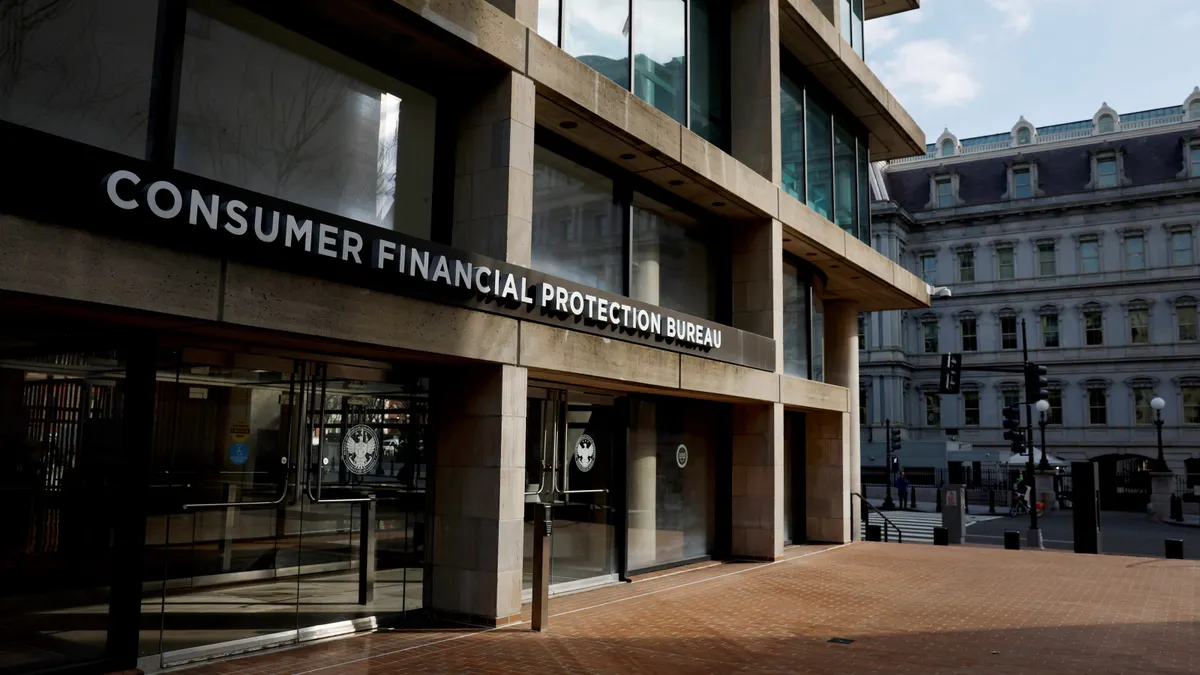Justice Department attorneys representing the Consumer Financial Protection Bureau asked an appeals court Friday to override a district court’s decision to again halt the bureau’s 1,500 layoffs, defending the way the bureau arrived at the job cuts figure.
“Once again, the district court is overriding the lawful manner in which the Bureau’s politically accountable leaders have chosen to operate this agency,” DOJ attorneys wrote in an emergency motion filed late Friday with the U.S. Court of Appeals for the D.C. Circuit.
Judge Amy Berman Jackson of the U.S. District Court for the District of Columbia on Friday temporarily paused the CFPB’s plan to cut off nearly 1,500 employees’ access to bureau systems as part of a reduction in force, Acting Director Russ Vought announced Thursday in memos.
Attorneys representing the National Treasury Employees Union had asked Berman Jackson on Thursday for an emergency hearing to force the CFPB to explain how the layoffs don’t violate the preliminary injunction the judge granted last month, or a pared-down order the appeals court issued earlier this month.
The appeals court had said the CFPB could issue RIF notices only after employees have been “determined, after an individualized assessment, to be unnecessary to the performance of [the] defendants’ statutory duties.”
In their Friday emergency motion with the appeals court, DOJ attorneys pointed to that stipulation, arguing that the CFPB is entitled to move ahead on employee cuts, despite the injunction, as long as a ‘particularized assessment’ that the affected employees are ‘unnecessary’ for performing the CFPB’s statutory duties” was first made.
New CFPB leadership under the Trump administration decided to “take the Bureau in a new direction that would perform statutory duties, better align with Administration policy, and right-size the Bureau,” DOJ attorneys wrote. They determined many CFPB offices were staffed with “far more employees” than necessary to fulfill statutory duties.
Chief Legal Officer Mark Paoletta worked with two other CFPB attorneys to conduct that assessment, going “line by line through each competitive area to determine how many employees were necessary in each area.”
The conclusion from that “careful, unit-by-unit analysis”: A 200-person bureau allows the CFPB to fulfill statutory obligations “and better aligns with the new leadership’s priorities and management philosophy,” the court document says.
DOJ attorneys argued it’s the CFPB’s call – not the plaintiffs’ or a court’s – as to exactly how many bureau employees are necessary to fulfill statutory duties.
DOJ attorneys also defended the “assessment” conducted to arrive at the 200 figure.
The district court noted that Paoletta didn’t detail any consultation with the heads of various offices involved, and the NTEU said managers in a statutorily mandated consumer response unit weren’t consulted on staffing levels.
“But the particularized-assessment requirement does not impose strictures on the consultation processes defendants choose to use to make their determinations,” DOJ attorneys contended. “Nor does it required [sic] an individualized assessment as to whether a particular employee has been among ‘the ones who carry out the day-to-day tasks involved in fulfilling [statutory] obligations.’”
The approach taken by Paoletta and his team was “entirely sufficient,” the attorneys argued.
Attorneys representing the NTEU, however, wrote in a Monday letter to the appeals court that evidence “strongly suggest[s]” no particularized assessment was conducted, and the layoffs would violate the data-deletion and consumer response provisions of the district court’s injunction.
It’s “unfathomable” that cutting the bureau’s staff by 90% in about 24 hours wouldn’t impede the CFPB’s ability to perform statutory duties, and similarly hard to imagine the CFPB conducted a careful assessment of employee roles in less than four business days following the appeals court’s mandate, NTEU lawyers argued Thursday.
Ultimately, DOJ attorneys argued that the NTEU and Berman Jackson shouldn’t be allowed to “second-guess” the CFPB’s determination that the employees being cut are unnecessary to perform the bureau’s statutory duties, or pursue an inquisition into how that determination was made.






















